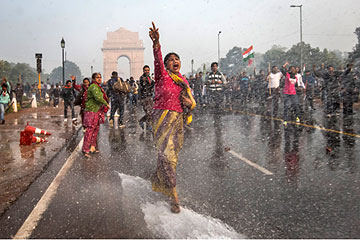
In Delhi, marchers face water spray from police
Every Indian media outlet has a name for her: Amanat (Treasure). Nirbhaya (Fearless). Braveheart. India's Girl. She can't be named, but she bears the name of every woman in India.
If she had been allowed to live, she would have been a paragon of the progress Indian women are making. She was studying to be a physiotherapist. She was the only person supporting her rural family. She was going to marry a software engineer in February. She was 23. She was, for God's sake, only 23. But she lived — and has now been cremated — in Delhi.
Every one of my female friends who's visited or lived in New Delhi has a story about the men there. Christine from Paris was walking in Connaught Place, the heart of the city, with her mother. Christine is an anthropologist who wanted to show her mother, who was in India for the first time, what a wonderful country it was. A man came up to them and thrust his hand between Christine's legs, grabbing her crotch. He laughed and sauntered off. "My mother had to watch this," Christine said, weeping. But she knows that Indian women — especially the poor and the low caste — suffer worse.
New Delhi isn't the only Indian city where bad things happen to women, but it has a special reputation. Perhaps it's the political corruption that transforms into moral corruption; perhaps it's North Indian machismo; perhaps it's the skewed sex ratio — 866 females for every 1,000 males, because many girls are killed at birth by parents who'd rather have a son. The numbers bear it out: New Delhi has more rapes than Mumbai, Kolkata, Chennai, Bangalore and Hyderabad put together.
All over the country, the gang rape has galvanized Indians into an agonized national discussion about how badly we treat our women. But some of the proposed solutions are wildly off the mark. Internet forums seethe with demands for the death penalty for rapists. Given the promptness with which Indian police round up the usual suspects in any high-profile case, this would result in many innocent men being hanged. "Enforcement is more important than a new law," pointed out the victim's fiancé, who was attacked with her.
The way the country deals with sexual assault has to change at the most basic level: at the police stations where rape is reported, in the doctors' clinics where the victim is examined and in the courts where the victim is cross-examined.
Many doctors still use the "finger test," in which they penetrate the rape survivor with one, then two fingers. The medical report will note such things as the "laxity of the vagina": the implication is that if it is lax, so are the woman's morals. If two fingers can enter her vagina, the report might say she has been "habituated to sexual intercourse" — a term that the defense will use in questioning her credibility. No wonder that three-quarters of rape prosecutions end in acquittal. Although the Supreme Court has ruled that the finger test cannot be considered as evidence, it is still used in many states.
Most women in that part of the world stay clear of police stations for their own safety. A friend, an influential filmmaker, told me about what happened when he reported the embezzlement of a large sum by his accountant. The accountant had fled town, so the police arrested the accountant's sister — who had not been involved in the crime — to put pressure on her brother to surrender. When my friend went to the station, the officer in charge told him that the sister was in the lockup and invited him to "do what you want with her." Fearing for her safety, my friend had a man from his office sit at the station day and night, guarding her from the police.
The rot begins at the top. Six sitting members of state legislatures have been charged with rape; two members of Parliament and 36 state legislators have been charged with crimes against women. In the 2009 national elections, political parties fielded no fewer than 40 candidates who were charged with rape or other crimes against women.
The country seems to have had enough. There are silent marches, candlelit vigils. There is outrage in the papers, on television. Thus did people gather after the 2008 terrorist attacks here to demand better security; thus did people gather in 2011 to protest corruption. This is the third massive wave of protest, and this time it's to demand the most elementary respect for India's 591 million females. But can it be sustained?
"Here's the bottom line," said Barack Obama about gun control. "We're not going to get this done unless the American people decide it's important." About fighting rape in India, here's the bottom line. We're not going to get this done unless the Indian people decide it's important.
Mehta is the author of Maximum City and a journalism professor at New York University
